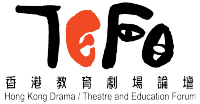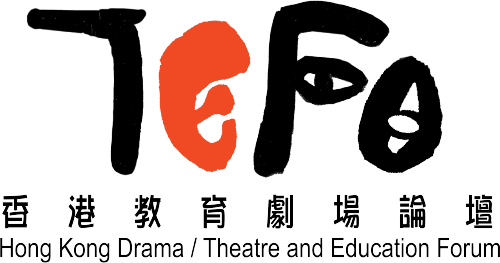Archiving and reporting on the arts is just as important as the execution of artistic practice by itself.
The archival and recording of theatrical work may not be a part of creating the actual work, but it makes sure that theatrical happenings live beyond their ephemerality.
Careful recording and detailed reflections are extensions of the creative process behind any performance, educational program or workshop, and can become valuable learning resources for the entire field.
At TEFO, we’ve always been thinking about how to fulfill our responsibility to develop ourselves as a networking and consulting organization for other practitioners in this field, and we hope that the principle of “Shared Knowledge” can continue carrying us forward in this work.
Thus, we are continually working to strengthen our online database’s ability to gather, organize and preserve applied theatre practice here in Hong Kong, so that our field’s research, records and archives can inspire present and future generations of applied theatre practitioners.
Please note that our English database is still under construction, and there may not be as much content as our Chinese database. For more resources, please visit the Chinese version of our website.
Participating in IDIERI 10: Observations and Reflections|DaTEAsia Vol. 11
今年七月,我到英國華威大學參加了第十屆國際教育戲劇研究所(International Drama in Education Research Institute,下稱IDIERI 10)這國際會議。本文分享個人在當中的觀察和反思。
The Preliminary Exploration and Reflection on the Development and Execution of Drama and Creative-based Cross-disciplinary and Integrated Curriculum Design aiming at Exploring Local Culture and Art|DaTEAsia Vol. 11
This paper aims at exploring how the cross-disciplinary teachers in arts and humanities work together through discussions and workshops to design and develop the interdisciplinary place-based and art-and-humanity based courses and curriculum mainly starting from perspectives of drama education. The main objective of the project of Sailing of Art and Culture: The Fantasy Journey of Whale Islands is to cultivate the teachers’ community executed by National University of Tainan. We also hope to develop and figure out the logic and connection among these different theories involved in the new curriculum development to apply them into our course design and teaching pedagogies. These related theories include post-modern art education theories, cross-disciplinary curriculum development theories, place-based education, narrative ability research as well as inquiry-based educational pedagogy research. The paper also tries to analyze the developing and discussion process in building the two new courses by the teachers’ community. Furthermore, it aims to develop the innovative educational pedagogy and strategies to teach and evaluate students’ growth in their various narrative abilities. It also hopes to investigate the learning impact and effects of these place-based general education courses in developing the students’ creative abilities to help the local cultural and economic development for more teachers and students to adapt and learn from in the future.
Reykjavik Reflections: Where next? |DaTEAsia Vol. 11
This article results from reflections on the 9th International Drama/Theatre and Education Association (IDEA) World Congress, which took place in Reykjavik, Iceland from July 04th-08th 2022. The Congress title was DRAMA 4ALL. Drama for Tall and Small.
A Practitioner’s Reflection on an Online Course under COVID-19 | DaTEAsia Vol. 10
In this paper, the author reflects on the delivery of a sub-degree course in hybrid mode under COVID-19 from the perspective of a drama educator. The course aims to equip students with expressive, artistic means to discovery themselves and write their self-narratives. The author reviews some students’ self-reflected assignments and their encounters in the hybrid learning environment—a mix of simultaneous online and F2F teaching and learning. She finds that students can be seen as “prosumers” of their arts experiences, and raises the question of the nature of “presence” in mediated online learning environment. At the end of the paper, the author reflects on the possible pedagogical implications of her online teaching experiences for drama education.
Some Reflective Notes on Directing the Online Auto-Ethnotheatre See You Zoom – An Account of the Lives of Hongkongers in the Dramatic 2020 | DaTEAsia Vol. 10
This article accounts the director’s reflection on the creating and performing of the auto-ethnotheatre See You Zoom series (February-October 2020), through the video-conferencing software Zoom during the staying home period due to COVID-19. Driven by an urge to connect community people under the cumulative impact of the social unrest and the pandemic since mid-2019, the director started this creative journey, encountered challenges, and gained insights of devising, rehearsing and staging auto-ethnotheatre entirely through Zoom. Three aspects of online theatre-making were reflected: (i) working with actors without their physical presence (ii) playing with the public and private spaces, and (iii) managing the engagement of Zoom participatory-audience.
Elements of Drama Applied for Emotional Support to Children during the Pandemic (Chinese) | DaTEAsia Vol. 10
During the pandemic, conflicts arise readily between homebound parents and children and result in emotional instability. In this article, the author shares how elements of drama can be applied to help children, teenagers and parents regulate their emotions and foster a healthy parent-child relationship. This article illustrates that appropriate application of elements of drama promotes quality parent-child interaction, through which children learn to regulate their emotions.




